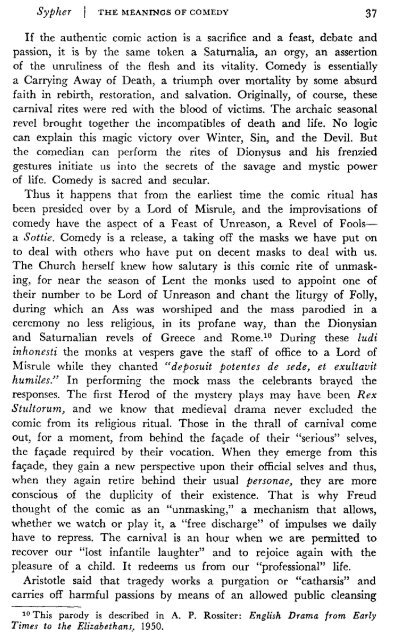The Meanings of Comedy* - Shakespeare Navigators
The Meanings of Comedy* - Shakespeare Navigators
The Meanings of Comedy* - Shakespeare Navigators
Create successful ePaper yourself
Turn your PDF publications into a flip-book with our unique Google optimized e-Paper software.
Sypher j<br />
rrm MEANTNcs oF coMEDY 97<br />
If the authentic comic action is a sacrifice and a feast, debate and<br />
passion, it is by the same token a Saturnalia, an org'y, an assertion<br />
<strong>of</strong> the unruliness <strong>of</strong> the flesh and its vitality. Comedy is essentially<br />
a Carrying Away <strong>of</strong> Death, a triumph over mortality by some absurd<br />
faith in rebirth, restoration, and salvation. Originally, <strong>of</strong> course, these<br />
carnival rites were red with the blood <strong>of</strong> victims. <strong>The</strong> archaic seasonal<br />
revel brought together the incompatibles <strong>of</strong> death and life. No logic<br />
can explain this magic victory over Winter, Sir5 and the Devil. But<br />
the comedian can perform the rites <strong>of</strong> Dionysus and his frenzied<br />
gestures initiate us into the secrets <strong>of</strong> the savage and mystic power<br />
<strong>of</strong> life. Comedy is sacred and secular.<br />
Thus it happens that from the earliest time the comic ritual has<br />
been presided over by a Lord <strong>of</strong> Mismle, and the improvisations <strong>of</strong><br />
comedy have the aspect <strong>of</strong> a Feast <strong>of</strong> lJnreason, a Revel <strong>of</strong> Foolsa<br />
Sottie. Comedy is a release, a taking <strong>of</strong>f the masks we have put on<br />
to deal with others who have put on decent masks to deal with us.<br />
<strong>The</strong> Church herself knew how salutary is this comic rite <strong>of</strong> unmasking,<br />
for near the season <strong>of</strong> Lent the monks used to appoint one <strong>of</strong><br />
their number to be Lord <strong>of</strong> IJnreason and chant the liturgy <strong>of</strong> Folly,<br />
during which an Ass was worshiped and the mass parodied in a<br />
ceremony no iess religious, in its pr<strong>of</strong>ane way, than the Dionysian<br />
and Saturnalian revels <strong>of</strong> Greece and Rome.1o During these ludi<br />
inhonesti the monks at vespers gave the staff <strong>of</strong> <strong>of</strong>fice to a Lord <strong>of</strong><br />
Misrule while they chanted "deposuit potentes de sede, et exultauit<br />
humiles." In performing the mock mass the celebrants brayed the<br />
responses. <strong>The</strong> first Herod <strong>of</strong> the mystery plays may have been Rex<br />
Stultorum, and we know that medieval drama never excluded the<br />
comic from its religious ritual. Those in the thrall <strong>of</strong> carnival come<br />
out, for a moment, from behind the fagade <strong>of</strong> their "serious" selves,<br />
the fagade required by their vocation. When they emerge from this<br />
fagade, they gain a new perspective upon their <strong>of</strong>ficial selves and thus,<br />
when they again retire behind their usual personae, they are more<br />
conscious <strong>of</strong> the duplicity <strong>of</strong> their existence. That is why Freud<br />
thought <strong>of</strong> the comic as an "unmasking," a mechanism that allows,<br />
whether we watch or play it, a "free discharge" <strong>of</strong> impulses we daily<br />
have to repress. <strong>The</strong> carnival is an hour when we are permitted to<br />
recover our "lost infantile laughter" and to rejoice again with the<br />
pleasure <strong>of</strong> a child. ft redeems us from our "pr<strong>of</strong>essional" life.<br />
Aristotle said that tragedy works a purgation or "catharsis" and<br />
carries <strong>of</strong>f harmful passions by means <strong>of</strong> an allowed public cleansing<br />
10 This parody is described in A. P. Rossiter: English Drama ftom Early<br />
Times to the Elizabethans, 1950.


